THE STATUS OF THE ROAD TRANSPORT EXECUTIVE
Page 62
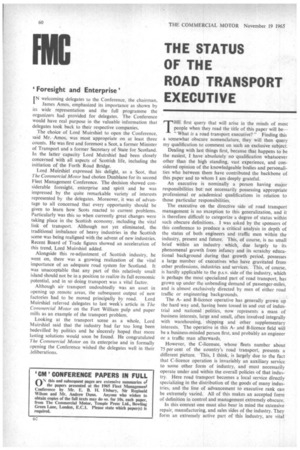
Page 63
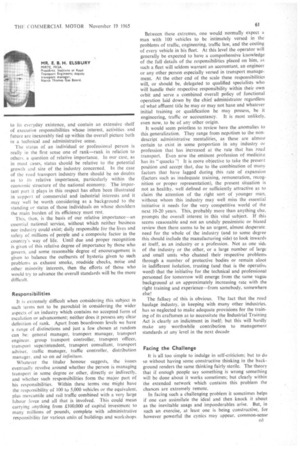
Page 64
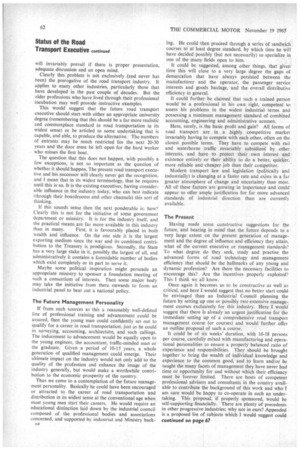
Page 69
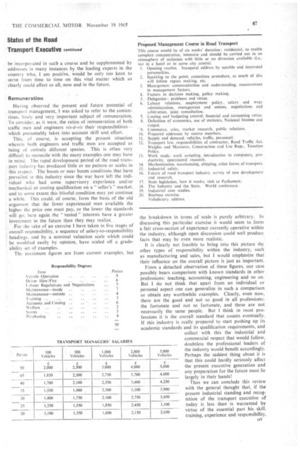
Page 70
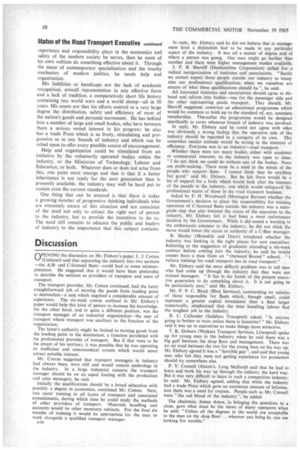
If you've noticed an error in this article please click here to report it so we can fix it.
THE first query that will arise in the minds of most people when they read the title of this paper will be" What is a road transport executive?" Finding this a somewhat obscure nomenclature, they will then query my qualification to comment on such an exclusive subject.
Dealing with last things first, because that happens to be the easiest, I have absolutely no qualification whatsoever other than the high standing, vast experience, and considered opinion of the knowledgeable bodies and personalities who between them have contributed the backbone of this paper and to whom I am deeply grateful.
An executive is nominally a person having major responsibilities but not necessarily possessing appropriate professional or academical qualifications in relation to those particular responsibilities.
The executive on the directive side of road transport management is no exception to this generalization, and it is therefore difficult to categorize a degree of status within such obscure definitions. I was asked by the sponsors of this conference to produce a critical analysis in depth of the status of both engineers and traffic men within the industry, present and future. This, of course, is no small brief within an industry which, due largely to its phenomenal growth from infancy and its scratchy educational background during that growth period, possesses a large number of executives who have gravitated from other professions, industries and services. This, of course, is hardly applicable to the p.s.v. side of the industry, which is perhaps the most specialized part of road transport, has grown up under the unbending demand of passenger-miles, and is almost exclusively directed by men of either road
traffic or engineering backgrounds. .
The Aand B-licence operative has generally grown up the hard way and, having been tossed in and out of industrial and national politics, now represents a mass of business interests, large and small, often involved integrally with warehousing, shipping and other supplementary interests. The operative in this Aand B-licence field will be a business-minded person first, and probably an engineer or a traffic man afterwards.
However, the C-licensee, whose fleets number about 75 per cent of the country's road transport, presents a different picture. This, I think, is largely due to the fact that C-licence operation is invariably an auxiliary service to some other form of industry, and must necessarily operate under and within the overall policies of that industry. Here road transport becomes a local service directly specializing in the distribution of the goods of many industries, and the line of advancement to executive rank can be extremely varied. All of this makes an accepted form of definition in control and management extremely obscure.
In this context one must also bear in mind the extensive repair, manufacturing, and sales sides of the industry. They form an extremely active part of this industry, are vital to its everyday existence, and contain an extensive shelf of executive responsibilities whose interest, activities and future are inexorably tied up within the overall picture both in a technical and administrative sense.
The status of an individual or professional person is really in the first sense one of rank—rank in relation to others, a question of relative importance. In our case, as in most cases, status should be relative to the potential growth and size of the industry concerned. In the case of the road transport industry there should be no doubts as to its relative importance, particularly within the economic structure of the national economy. The important part it plays in this respect has often been illustrated in support of commercial and industrial interests and it may well be worth considering as a background to the standing or status of those individuals on whose shoulders the main burden of its efficiency must rest, This, then, is the basis of our relative importance—an essential national service, without which neither business nor industry could exist; daily responsible for the lives and safety of millions of people and a composite factor in the country's way of life. Until due and proper recognition is given of this relative degree of importance by those who govern, and some reasonable degree of encouragement is given to balance the outbursts of hysteria given to such problems as exhaust smoke, roadside checks, noise and other minority interests, then the efforts of those who would try to advance the overall standards will be the more difficult.
Responsibilities it is extremely difficult when considering this subject in such terms not to be parochial in considering the wider aspects of an industry which contains no accepted form of escalation or advancement; neither does it possess any clear definition of rank. Apart from boardroom levels we have a range of distinctions and just a few chosen at random can be: general manager, transport manager, transport engineer, group transport controller, transport officer, transport superintendent, transport consultant, transport adviser, traffic manager, traffic controller, distribution manager, and so on ad infinitutn.
Whatever the titular honour suggests, the issues eventually revolve around whether the person is managing transport in some degree or other, directly or indirectly, and whether such responsibilities form the major part of his responsibilities. Within these terms one might have the responsibility of 100 to 5,000 vehicles or the equivalent. plus mercantile and rail traffic combined with a very large labour force and all that is involved. This could mean carrying anything from £100,000 of capital investment to many millions of pounds, complete with administrative responsibility for various units of buildings and workshops Between these extremes, one would normally expect a man with 100 vehicles to be intimately versed in the problems of traffic, engineering, traffic law, and the costing of every vehicle in his fleet. At this level the operator will generally be expected to have a comprehensive knowledge of the full details of the responsibilities placed on him, as such a fleet will seldom warrant an accountant, an engineer or any other person especially versed in transport manage-. meat. At the other end of the scale these responsibilities will, or should be, delegated to qualified specialists who will handle their respective responsibility within their own orbit and serve a combined overall policy of functional operation laid down by the chief administrator regardless of what affluent title he may or may not have and whatever initial training or qualification he may possess, be it engineering, traffic or accountancy. It is most unlikely. even now, to be of any other origin.
It would seem pointless to review here the anomalies to this generalization. They range from nepotism to the nondescript administrative mentalities, as these are almost certain to exist in some proportion in any industry or profession that has increased at the rate that has road transport. Even now the eminent profession of medicine has its "quacks "! It is more objective to take the present position and accept that, due to the combination of many factors that have lagged during this rate of expansion (factors such as inadequate training, remuneration, recognition or proper representation), the present situation is not as healthy, well defined or sufficiently attractive as to claim the attention of the right sort of younger man, without whom this industry may well miss the essential initiative it needs for the very competitive world of the next 10-20 years. This, probably more than anything else, prompts the overall interest in this vital subject. If this seems reasonable and not an unduly pessimistic or biased review then there seems to be an urgent, almost desperate. need for the whole of the industry (and to some degree this should include the manufacturing side) to look inwards at itself, as an industry or a profession. Not as one sick of the industry or the other, or a large number of large and small units who channel their respective problems through a number of protective bodies or remain aloot in indifferent isolation, trusting (and that is the operative word) that the initiative for the technical and professional personnel for tomorrow will emerge from the same vague background at an approximately increasing rate with the right training and experience—from somebody, somewhere else!
The fallacy of this is obvious. The tact that the road haulage industry, in keeping with many other industries, has so neglected to make adequate provisions for the training of its craftsmen as to necessitate the Industrial Training Act is clearly an indictment in itself; but this will hardly make any worthwhile contribution to management standards at any level in the next decade Facing the Challenge It is all too simple to indulge in self-criticism; but to do so without having some constructive thinking in the background renders the same thinking fairly sterile. The theory that if enough people say something is wrong something will be done about it works sometimes; but clearly within the extended network •which contains this problem the chances are extremely remote.
In facing such a challenging problem it sometimes helps if one can assimilate the ideal and then knock it about as the inevitable snags and imponderables arise. But, in such an exercise, at least one is being constructive, for however powerful the cynics may appear, common-sense will invariably prevail if there is proper presentation, adequate discussion and an open mind.
Clearly this problem is not exclusively (and never has been) the prerogative of the road transport industry. It applies to many other industries, particularly those that have developed in the past couple of decades. But the older professions who have lived through their professional incubation may well provide instructive examples.
This would suggest that the future road transport executive should start with either an appropriate university degree (remembering that this should be a far more realistic and commonplace standard in road transportation in its widest sense) or be articled to some undertaking that is capable, and able, to produce the alternative. The numbers of entrants may be much restricted for the next 20-30 years and the door must be left open for the hard worker who misses the first boat.
The question that this does not happen, with possibly a few exceptions, is not so important as the question of whether it should happen. The present road transport executive and his successor will clearly never get the recognition, and I mean that in its widest terminology, that he requires until this is so. It is the existing executives, having considerable influence in the industry today, who can best indicate (through their boardrooms and other channels) this sort of thinking.
If this sounds sense then the next ponderable is: how? Clearly this is not for the initiative of some government department or ministry. It is for the industry itself, and the practical means are far more available in this industry than in many. First, it is favourably placed in both wealth and influence. On the one side it is the largest exporting medium since the war and its combined contribution to the Treasury is prodigious. Secondly, the State has a very large stake in it, possibly the largest of all, and administratively it contains a formidable number of bodies which exist completely or in part to serve it.
Maybe some political inspiration might persuade an appropriate ministry to sponsor a foundation meeting of such a consortium of interests. Then some major body may take the initiative from there onwards to form an industrial panel to beat out a national policy.
The Future Management Personality If from such sources as this a reasonably well-defined line of professional training and advancement could be assured, then the young man could confidently set out to qualify for a career in road transportation, just as he could in surveying, accounting, architectu're, and such callings. The inducement to advancement would be equally open to the young engineer, the accountant, traffic-minded man or the graduate. Given a period of 10-15 years, a whole generation of qualified management could emerge. Their ultimate impact on the industry would not only add to the quality of the profession and enhance the image of the industry generally, but would make a worthwhile contribution to the economic prosperity of the country.
Thus we come to a contemplation of the future management personality. Basically he could have been encouraged or attracted to the career of road transportation and distribution in its widest sense at the conventional age when most young men start their careers. He would require an educational distinction laid down by the industrial council composed of the professional bodies and associations concerned, and supported by industrial and Ministry back. ing. He could then proceed through a series of sandwich courses to at least degree standard, by which time he will have decided possibly (but not necessarily) to specialize in one of the many fields open to him.
It could be suggested, among other things, that given time this will close to a very large degree the gaps of demarcation that have always persisted between the manufacturer and the operator, the passenger service interests and goods haulage, and the overall distributive efficiency in general.
It could further be claimed that such a trained person would be a professional in his own right, competent to assess his problems in the widest industrial terms and possessing a minimum management standard of combined accounting, engineering and administrative acumen.
Here, surely, is the basic profit and gain? All forms of road transport are in a highly competitive market invariably having to compete with each other, often on the closest possible terms. They have to compete with rail and waterborne traffic invariably subsidized by other interests, and have to protect their own interest and existence entirely or their ability to do a better, quicker,. more reliable and cheaper job than their competitor.
Modern transport law and legislation (politically and industrially) is changing at a faster rate and exists in a far greater atmosphere of change and uncertainty than most. All of these factors are growing in importance and could appear to offer ample justification for far more advanced standards of industrial direction than are currently available.
The Present Having made some constructive suggestions for the future, and bearing in mind that the future depends to a very large extent on the present generation of management and the degree of influence and efficiency they attain, what of the current executive or management standards? To what degree do they seek, study and practise the advanced forms of road technology and management efficiency that should be the hallmarks of any young and dynamic profession? Are there the necessary facilities to encourage this? Are the incentives properly exploited? This I think we all know.
Once again it becomes us to be constructive as well as critical, and here I would suggest that no better start could be envisaged than an Industrial Council planning the future by setting up one or possibly two extensive management courses exclusively for this industry. Here I would suggest that there is already an urgent justification for the immediate setting up of a comprehensive road transport management course (or courses) and would further offer an outline proposal of such a course.
It could be of six weeks' duration, with 16-18 persons per course, carefully mixed with manufacturing and operational personalities to ensure a properly balanced ratio of experience and responsibilities. They should be brought together to bring the wealth of individual knowledge and experience to the common good, and to learn and/or be taught the many facets of management they have never had time or opportunity for and without which their efficiency must be forever limited. There are hosts of competent professional advisers and consultants in the country available to contribute the background of this work and who I am sure would be happy to co-operate in such an undertaking. This proposal, if properly sponsored, would be self-supporting financially. There are plenty of precedents in other progressive industries; why not in ours? Appended is a proposed list of subjects which I would suggest could continued on page 67
be incorporated in such a course and be supplemented by addresses in many instances by the leading experts in the country who, I am positrve, would be only too keen to serve from time to time on this vital matter which so clearly could affect us all, now and in the future.
Remuneration Having observed the present and future potential of
• transport management, I was asked to refer to the contentious, lively and very important subject of remuneration. To consider, as it were, the ratios of remuneration of both traffic men and engineers vis-a-vis their' responsibilitieswhich presumably takes into account skill and, effort.
This, of course, is accepting the preseni situation wherein both engineers and traffic men are accepted as being of entirely different species. This is often very difficult to reconcile with the many examples one may have in mind. The rapid development period of the road transport incluory has produced little or no pattern or scales in this respect. The boom or near boom conditions that have prevailed in this industry since the war have left the indiilidual who had some supervisory , experience and!or mechanical or costing qualification on a " seller's " market, and to some extent this blissful condition may Yet continue a while. This could, of course, form the basis of the old argument that the fewer experienced men available the higher the price one must 'pay, or the lower the standards will go; here again. the " Vested " interests have a greater investment in the future than they may realize.
For the sake of an exercise 1. have taken in five stages of overall responsibility, a sequence of salary-to-responsibility headings. and by a nominal valuation scale which could be modified easily by opinion, have scaled off a gradeability set of examples.
The maximum figures are from current examples, but the breakdown in terms of scale is purely arbitrary. In discussing this particular exercise it would seem to form a fair cross-section of experience currently operative within the industry, although open discussion could well produce facts that may be even more realistic, It is clearly not feasible to bring into this picture the other types of responsibility within the industry, such as manufacturing and sales, but I would emphasize that their influence on the overall picture is just as important.
From a detached observation of these figures, our case possibly bears comparison with known standards in other professions: teaching, accounting, engineering and so on. But I do not think that apart from an individual or personal aspect one can generalize in such a comparison or obtain any worthwhile examples. Clearly, even now, there are the good and not so good in all professions; the fortunate and not so fortunate, and these are not necessarily the same people. But I think in most professions it is the overall standard that counts eventually. If this industry is really prepared to start pushing up its academic standards and its qualification requirements, and collect with this the industrial and commercial respect that would follow, doubtless the professional leaders of the industry would benefit accordingly. Perhaps the saddest thing about it is that this could hardly seriously affect the present executive generation and any preparation for the future must lie largely in their hands!
5,000 Vehicles E 5,000 4,600
Thus we can conclude this review with the general thought that, if the present industrial standing and recognition of the transport executive of today is less than -is warranted by virtue of the essential part his skill, training, experience and responsibility,
experience and responsibility plays in the economics and safety of the modern society he serves, then he must of his own volition do something effective about it. Through the maze of contemporary specialization and the touchy mechanics of modern politics, he needs help and organization.
His liabilities or handicaps are the lack of academic recognition, overall representation in any effective form and a lack of tradition, a comparatively short life history containing two world wars and a world slump—all in 50 years. His assets are that his efforts control to a very large degree the distribution, safety and efficiency of most of the nation's goods and personal movement. He has behind him a number of large and small bodies, who have between them a serious vested interest in his progress; he also has a trade Press which is as lively, stimulating and progressive as in any branch of industry and which can be relied upon to offer every possible source of encouragement.
Help and organization could be stimulated from an initiative by the voluntarily operated bodies within the industry, or the Ministries of Technology, Labour and Education, or both. Whatever does or does not arise from this, one point must emerge and that is that if a better inheritance is not ready for the next generation than is presently available, the industry may well be hard put to sustain even the current standards.
One thing that can be assured is that there is today a growing number of progressive thinking individuals who are extremely aware of this situation and are conscious of the need not only to attract the right sort of person to the industry, but to provide the incentives to do so. The need still remains to educate the public and leaders of industry to the importance that this subject contains.
Discussion
OPENING the discussion on Mr. Elsbury's paper, L J. Cotton (Unilever) said that separating the industry into two sections —the A/Band C-licensed fleets—could lead to some misinterpretation. He suggested that it would have been preferable to describe the sections as providers of transport and users of transport.
The transport provider, Mr. Cotton continued, had the fairly straightforward job of moving the goods from loading point to destination—a task which required a considerable amount of experience. The six-week course outlined in Mr. Elsbury's paper would help this kind of person to increase his knowledge. On the other hand, and in quite a different position, was the transport manager of an industrial organization—the user of transport where transport was ancillary to the function of the organization.
The latter's authority might be limited to moving goods from the loading point to the destination, a function paralleled with the professional provider of transport. But if that were to be the extent of his territory, it was possible that he was operating an inefficient and uneconomical system which would never attract suitable trainees.
Mr. Cotton suggested that transport managers in industry had always been, were still and would remain underdogs in the industry. In a large industrial concern the transport manager should be on an equal footing with the production and sales managers, he said.
Initially the qualifications should be a broad education with possibly a degree in economics, continued Mr. Cotton. Next, two years' training in all facets of transport and associated commitments, during which time he could study the methods of other providers of transport. 'Materials handling and accounts would be other necessary subjects. For the final six months of training it would be appropriate for the man to work alongside a qualified transport manager.
n10
In reply, Mr. Elsbury said he did not believe that at management level a distinction had to be made in any particular aspect of the industry. It was all a matter of degree and of where a person was going. One man might go further than another and there were higher management studies available.
J. P. B. Sherriff (Dunfermline Corporation) called for a radical reorganization of institutes and associations. "Surely we cannot expect those people outside our industry to recognize our professional qualifications when we ourselves are unsure of what these qualifications should be ", he said.
All interested institutes and associations should agree to disband and reform into bodies—one for the passenger side and the other representing goods transport. They should, Mr. Sherriff suggested, construct an educational programme which would be common to both up to the standard of, say, associate membership. Thereafter the programme would be designed specifically to cover whatever branch of industry was involved.
In reply, Mr. Elsbury said he could not agree with what was obviously a strong feeling that the operative side of the industry should be regarded in a category of its own. This somewhat insular attitude would be wrong in the interests of efficiency. Everyone was in an industry—road transport.
Whether there were too many bodies, either with academic or commercial interests, in the industry was open to issue. "I do not think we could do without any of the bodies. None are profit-making. There must be a need in the minds of the people who support them. I cannot think they do anything but good," said Mr. Elsbury. But he felt there would be a lot of support for a body which would look after the interests of the people in the industry, one which would safeguard the professional status of those in the road transport business.
Asked by F. H. Woodward (Montague Burton) whether the Government's decision to place the responsibility for training operators of C-licensed fleets outside the industry was a retrograde step that also lowered the status of the executive in the industry, Mr. Elsbury felt it had been a most unfortunate decision by the Government. While it did sound a warning to the enthusiastic amateur in the industry, he did not think the move would lower the status or authority of a C-fleet manager.
R. Harley (Meredith and Drew) wondered whether the industry was looking in the right places for new executives. Referring to the suggestion of graduates attending a six-week seminar before coming into the industry. he said he would sooner have a man from an "Outward Bound" school. "I believe training for road transport lies in road transport."
Mr. Elsbury said the most difficult problem was to tell men who had come up through the industry that they were not trained managers. "It lies in the hands of the present executive generation to do something about it. It is not going to be particularly easy," said Mr. Elsbury.
Mr. P. P. C. Block (Blox Services), commenting on salaries of those responsible for fleets which, though small, could represent a greater capital investment than a fleet larger numerically, emphasized that the man handling labour had the toughest job in the industry.
R. C. Callender (Saddlers Transport) asked: "Is anyone going to bother to train unless there is incentive?" Mr, Elsbury said it was up to executives to make things more attractive.
T. K. Dobson (Walkers Transport Services, Liverpool) spoke up for young men in the industry when he said there was a big gulf between the shop floor and management. There was no set road between the two for the young man on his way up. Mr. Elsbury agreed it was a "horrible gap ", and said that young men who felt they were not getting experience for promotion should try somewhere else,
P. V. Connell (Alston's. Long Melford) said that he had to learn and work his way up through the industry the hard way. But it was very difficult to learn in such a competitive industry, he said. Mr. Elsbury agreed, adding that while the industry had a trade Press which gave an enormous amount of information there was a need for courses. People such as Mr. Connell were "the red blood of the industry ", he added.
The chairman, James Amos, in bringing the questions to a close, gave what must be the views of many operators when he said: "Unless all the degrees in the world are acceptable to the men on the shop floor. , whoever you bring in, you are looking for trouble."
















































































































































